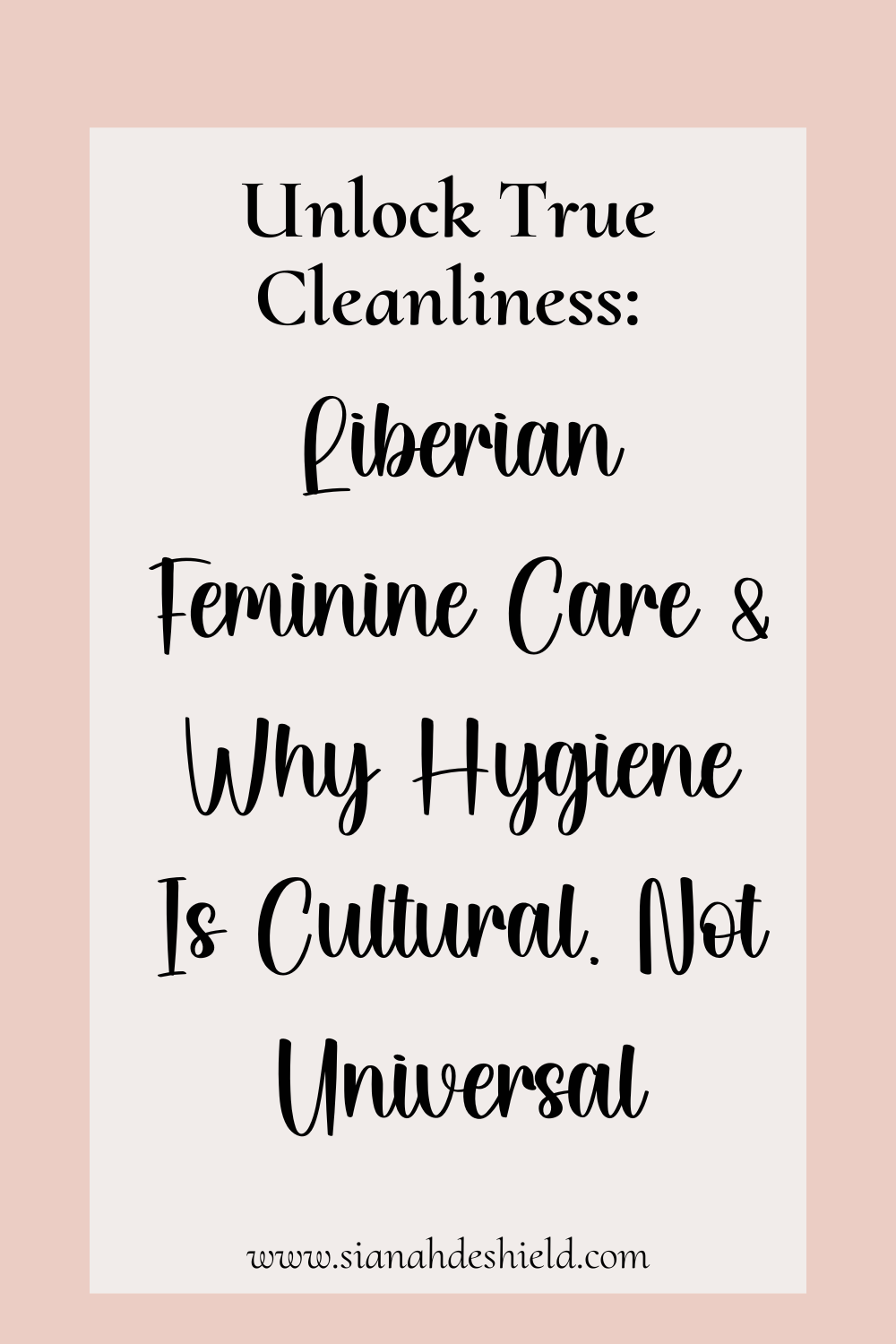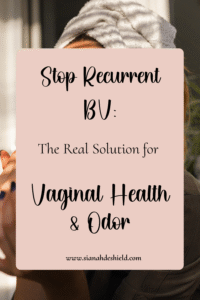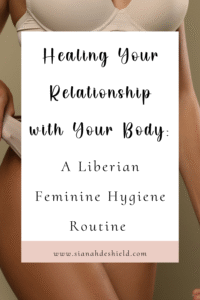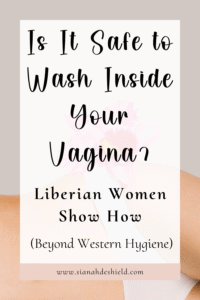Let’s talk about something that doesn’t get said enough: Hygiene is cultural, not universal. This post will empower you to unlock true cleanliness by diving deep into Liberian feminine care, offering a powerful counter-narrative to conventional feminine hygiene practices. If you were raised in a Western society, they probably told you:
- “The vagina cleans itself.”
- “Only wash the vulva.”
- “Never insert your finger inside your vagina to wash it.” And just like that, it became gospel, the only “correct” way to stay healthy and hygienic.
But here’s the question no one ever asks:
- Says who?
- Where did that belief come from?
- And why has it been positioned as the global standard, when for centuries, millions of women in other cultures have been doing things differently, and doing just fine, when it comes to vaginal cleaning? This is why Liberian feminine care offers a vital perspective.
Once Upon a Time… Even Westerners Didn’t Bathe
To understand how we got here, we need to rewind. This journey reveals why hygiene is cultural, not universal. In medieval Europe, most people bathed once a year. Yes, you read that right.
Europeans in those days believed that water could carry disease into the body. The solution was to cover up the smell. To do that, they used powders, perfumes, and scented handkerchiefs. Royalty would change clothes often to give the illusion of cleanliness, but they weren’t actually bathing. Women used lace and lemon peel tucked in their corsets to mask body odor. Ouch!
In fact, during Queen Elizabeth I’s reign, it was normal to wash the hands and face occasionally, but a full-body bath was almost unheard of. This historical context underscores the argument that hygiene is cultural, not universal.
Fast forward a few hundred years, and things have changed. Well… sort of changed, if I may say.
Modern West: Clean, But Not Always Thorough
Let’s have a grown-up conversation, because in 2024, “clean” doesn’t always mean what we think it means. Yes, most folks in the West bathe. But how they do it, how often, and what counts as clean is a whole different kind of story, further cementing the fact that hygiene is cultural, not universal.
Take deodorant, for starters. In France, a 2015 BVA poll found that 20% of people skip showers for days because, as many people proudly claimed, “my deodorant lasts 48 hours.” So I am imagining myself waking up, sweating through my day, then I go to bed without a shower, and wake up again, to spend the entire day not seeing the need to shower. It’s hard to imagine, but I am. That same survey noted that 1 in 3 French people don’t shower daily at all.
To be clear, this isn’t only a French thing. It’s a trend. In the West, and especially in wellness spaces, there’s a new kind of hygiene gospel spreading. “Let your body do the work, they say.” Natural oils are in. Soap is out because we have suddenly realized that soaps are “toxic.” Showers are optional, and with this trend, it won’t be long until it is like in Medieval times when people would rather not shower at all. People are swapping water for wellness products and calling it self-care.
One scroll through #SkinTok or any clean beauty corner of Instagram, and you’ll see it. There’s the influencer doing a 15-step skincare routine… with a messy bun and yesterday’s shirt. A proud mom is bragging that she doesn’t bathe her kids unless they stink. There’s even the “clean girl aesthetic” built on dry shampoo, underarm crystals, and essential oil mists with no soap in sight.
And let’s not even get into the “Europeans don’t wear deodorant” stereotype. A 2020 study by in Euromonitor showed deodorant sales per capita in Western Europe are significantly lower than in Latin America or Africa. Not because they’re using something else, but because many don’t use anything at all. Add that to the fact that some Western wellness circles now claim aluminum-free and baking soda-free deodorant is “better for the body.”
But here’s the part that really makes you blink twice. These are often the same people telling the rest of the world not to wash inside their vaginas as it causes diseases. I sometimes wonder how using clean fingers and clean water to wash away body fluids gives diseases? Like, how possible is that? And keeping the body dirty prevents diseases? Isn’t that the opposite of it? This is exactly why we need to discuss Liberian feminine care and how to unlock true cleanliness.
It’s wild when you think about it. Some folks are out here skipping showers, spraying rosewater on three-day-old armpits, and calling themselves “natural,” yet they’re loudly telling Liberian women that water isn’t okay for the most sacred part of their bodies? This situation vividly illustrates why feminine hygiene isn’t one-size-fits-all.
Let’s be honest, this obsession with preserving “natural oils” has gone a little too far. Dermatologists agree that overly hot water and harsh soaps can strip the skin. Yes, warm showers are fine. But let’s not pretend that skipping soap altogether is revolutionary. Even experts say that you still have to clean the parts that get sweaty, smelly, and sticky.
Here’s what’s really going on. In many non-Western cultures, like Liberia, cleanliness is a daily routine, not just a physical one. It’s the bath you take at the end of the day to wash off the world. It’s the coconut or palm kernel oil you rub into your skin after. It’s the scrub that says, “I respect this body.” It’s saying “I don’t mask funk. I eliminate it.” This is the essence of Liberian feminine care and how it helps unlock true cleanliness.
So when someone who hasn’t showered in two days is telling you not to cleanse inside your vagina, even if they are a doctor or some expert as you think, it’s okay to side-eye and keep it moving. Because over here, we don’t rely on 48-hour deodorant and lavender mist. We believe in water. We believe in routine. We believe in being fresh, head to toe, every day. This reflects our belief that hygiene is cultural, not universal.
Another thing to note is that culture plays a huge role in our beliefs, whether scientific or not. While Western doctors would say that it is wrong to wash inside your vagina, and that it gives diseases, you will almost not find a Liberian doctor born and raised in Liberia who would tell you that you shouldn’t wash inside your vagina because it will give you bacteria. Therefore, we believe in what we practice. When you are raised in a culture where your upbringing is to make hygiene optional, you would find a way to justify it.
There is currently no scientific consensus or conclusive evidence proving that daily washing the inside of the vaginal canal with clean hands and plain water leads to disease. Much of the existing literature and conversations that discourages internal vaginal cleansing focuses only on commercial douching products which we all know often contain fragrances, antiseptics, and chemicals that are known to disrupt the vaginal microbiome, not on the controlled use of clean water alone. This vital distinction is key to understanding Liberian feminine care.
Liberian Feminine care or hygiene
Let’s bring it home to Liberia. Long before influencers were arguing about whether to wash inside or “let it clean itself,” Liberian women already had a routine. It wasn’t a trend, but a routine, a lifestyle, and a legacy passed from generation to generation. This is the heart of Liberian feminine care and Liberian wisdom.
In Liberia, hygiene isn’t only about smelling good. It’s about self-respect, dignity, and womanhood.
From the moment a girl enters puberty, the older ones teach her what to do and how to do it. Her mother doesn’t sit her down with a YouTube link or a clinical pamphlet. No. She shows her. She teaches her how Liberian women practice natural feminine hygiene.
And what does that look like?
- Warm water in a bucket every single day, twice a day.
- Squat comfortably and gently rinse inside your vagina. No soap, no fancy bottles, just clean fingers and clean water. This is how we unlock true cleanliness.
- Clear away old blood, leftover semen, discharge, or sweat.
- Do it before school, after sex, after your period, before bed.
- Pat dry with your towel. Change your underwear. Go on with your day, feeling clean and confident.
It’s that simple. This is intentional hygiene. Daily. Deliberate. And it works. This is what Liberian feminine care provides.
Liberian women don’t walk around wondering where the smell is coming from. They’re not Googling, “Why does my vagina smell like rotten onions?” or panicking over mystery stains in their underwear. They’ve already rinsed. Already aired out. Already reset.
Because in Liberia, hygiene is woven into everything. During your morning bath, you wash inside your vagina. Before you go to bed, before your man comes over, you clean. It’s not shameful. It’s not “extra.” It’s just what we do. This practice demonstrates that hygiene is cultural, not universal.
A clean body carries clean energy. Because walking around fresh changes how you show up in the world. And no, this isn’t about modern vs. primitive. In fact, it’s the opposite. We’ve been ahead. Way ahead. While others are still arguing about whether bathing daily strips your skin’s oils, we were already done with our second bath of the day and had moved on to cooking pepper soup.
So say what you want, but ask any Liberian woman. Real cleanliness starts with clean hands, clean water, and a clean vagina. This is natural feminine hygiene.
Liberian Aunties Don’t Whisper About Hygiene. They Preach It
If you grew up in a Liberian home, you already know that when it comes to hygiene, the aunties do not play. They don’t sugarcoat it. They don’t mumble. They will tell you straight that you smell. “Your body is your pride. If you’re not clean, you’re not ready to face the world.”
From the first day you start bleeding, a new chapter begins. You’re no longer “just a girl.” You’re a woman in training. And the women around you make sure you get the memo for when you start having sex, to start cleaning inside. Virgins aren’t allowed to wash inside their vaginas. Washing inside is only for those who are grown and no longer a virgin. This is a vital piece of Liberian wisdom.
Here are just a few of the sayings many Liberian girls grew up hearing:
- “Every time you pee, you must clean.” Not just wipe with a tissue. Liberian women are taught to rinse with water after urinating, especially during their periods. You don’t leave behind tissue bits, smells, or dampness. You rinse, dry, and feel fresh. This is how we unlock true cleanliness.
- “If you’re smelling yourself, that means that others can smell you two times over.” There’s no “ignore it and it’ll go away” mentality. If something smells off, you handle it immediately. Vaginal odor, body odor, funky discharge? The aunties will pull you aside and sort you out, with instructions, herbs if the scent is just too much. Because sometimes one needs to use herbs like rosemary and cloves to clean first before they can even start the regular daily cleaning. This reflects deep ancestral hygiene wisdom.
- “A clean woman can hold her head high.” When you know you’re clean, your energy shifts. You walk differently. You smile bigger. You dare to get close. These are the confidence routines rooted in Liberian wisdom.
These aren’t just one-liners. They’re formulas for self-respect. A kind of practical wisdom that’s rooted in love, tradition, and high standards.
And what’s wild? Many of these methods, like rinsing after sex or end of menstruation, bathing before bed, or using a separate towel just for down there, are now being pushed by modern wellness brands as “new discoveries.” But Liberian women have been doing this for centuries. With no fragrance-filled soaps. No overpriced yoni kits. Just knowledge, discipline, and clean water. This demonstrates why feminine hygiene isn’t one-size-fits-all.
So the next time someone raises an eyebrow at your routines or tries to label your traditions as “too much,” remember, our mothers knew what they were doing. Cleanliness wasn’t just hygiene. It was power. And it still is.
The Vagina Doesn’t Clean Itself Well Enough For You Not To.
Let’s discuss this. We’ve all heard the phrase: “The vagina is self-cleaning.” It’s repeated like gospel in every Western health brochure, every OB-GYN TikTok clip, every “clean girl aesthetic” Pinterest board. But here’s the thing. They’re not wrong, but they’re not telling the whole story either. This narrative often obscures the nuances of Liberian feminine care.
Yes, the vagina (the internal canal) has natural secretions that help flush out bacteria and maintain its pH. That’s true. Most of the time, that flushing is happening in your panties. Yeah, you know the look and the smell. Not all of it will seep down, though. Only a fraction will reach down into your panties. The rest will remain in there and buildup leaving a slimy muddy feel in your vagina because you are waiting for the vagina to perform a magic and do what you should be doing. This is precisely why Liberian feminine care advocates for proactive vaginal cleaning.
But if you live in Liberia, where the heat is hot-hot, the food is peppery, you sweat from places you didn’t know could sweat, then baby, that “self-cleaning” thing alone won’t cut it. I am not talking about just the vulva, labia area, or the folds, or just the crease between your thigh and your vagina, I mean the inside cleaning. The after sex, or post-period, cleanup.
Forget that lie they told you that you will only smell off when you have an underlying issue. It’s a lie with the same sauce as “All men cheat!” Someone wanted to make themselves feel better instead of solve their vagina odor problem. Whether it is the coldest day of winter and you are wrapped in the warmest clothing inside your home, your body secretes, and it needs to be washed off daily.
Let’s break it down:
1. “Self-cleaning” Doesn’t Mean “No cleaning”
Your oven has a self-cleaning button. But do you never wipe it down after roasting chicken? Does your fridge never need a sponge, even though it technically stays “cold and clean”? Exactly. The vagina is amazing. But it doesn’t mean you can skip your hygiene duties. Especially after:
- Sex (yes, semen lingers)
- Menstruation (clots don’t always exit perfectly)
- Sweaty days (The sun is not for the weak)
- Long hours in tight clothing or synthetic panties
This is a key component to truly unlock true cleanliness.
2. Cultural Context Matters
Most of the loudest voices shouting “don’t wash inside!” are not speaking from a Liberian perspective. They’re coming from cultures where the body odor conversation still includes debate and questions like:
“How many times a week should I shower?”
If you are still debating how many times you need to shower in a week, trust me, you shouldn’t be in the position to tell us how to wash our vaginas. Liberian women are not confused about hygiene. We don’t walk around with scented sprays in our bags trying to mask problems. We clean them. With warm water, clean fingers, and care. This is a testament to Liberian wisdom in feminine hygiene.
Passed down from our mothers. No chemicals. No fear.
3. Internal Washing Is Not the Enemy. Misinformation Is
Nobody is saying shove soap up there. Nobody is saying dig until you bleed. What Liberian women do is gently rinse out what shouldn’t be left behind. We insert a clean finger, swirl warm water, and clear away what doesn’t belong. Things like old blood, sweat, or leftover sperm. And that’s it. This is Liberian feminine care in action.
Western medicine has lumped all vaginal washing into one category: douching with chemicals. And that’s not what we’re doing. What we practice is intentional, careful cleansing, not the reckless “feminine washes” sold in plastic bottles at big box stores. This is crucial for natural feminine hygiene.
So the next time someone tells you, “Don’t wash inside. It cleans itself.” Ask them gently. “When was the last time you brushed your teeth? Or do you just let that clean itself too?”
Let them sit with that.
Clean is Cultural, Not Colonial
Just because something is common doesn’t mean it’s correct. And just because it’s Western doesn’t mean it’s wise. So when someone hits you with, “That’s not how we do it here,” the question becomes: Where exactly is “here”? Because “here” is usually North America, Europe, or that part of Africa where a good number of adults would shower and leave their homes without applying deodorant to their armpits. And when it comes to feminine hygiene, “here” has had a rocky track record. This historical context underscores why hygiene is cultural, not universal.
Let’s take a moment to consider the irony. These are the same regions that went centuries without bathing regularly. This is where, historically, perfume was invented not just for pleasure, but to mask filth. The same societies that told women to dab vinegar between their thighs, dust on talcum powder, or just press their legs together and “let nature do the work.”
Fast forward to today, and we still hear echoes of that same logic. Google “how to clean your vagina” and what do you see? A flood of results all repeating the same script:
- “Only wash the vulva.”
- “It’s self-cleaning so leave it alone.”
- “Don’t wash inside. It can cause bacteria.”
Now pause. Where is the body fluid supposed to go? The semen after sex? The sweat after a long, hot day in the sun? You’re telling women to just wait it out? Let it seep into their panties? Let it sit until discharge “naturally exits”? That’s not hygiene. That’s giving medieval vibes. That’s the modern remix of the old “dab-and-mask” method. It’s the same tune, just different lyrics. This is not how we unlock true cleanliness.
Meanwhile, in Liberia, we have never waited for discharge to do the cha-cha slide down our thighs. Our mothers, aunties, and grandmothers taught us how to gently go in and clean ourselves with water and clean hands. No soap. No perfume. No harsh sprays. Just care and common sense. This is Liberian feminine care.
Because in our culture, when you sweat, you wash. When you are done bleeding, you rinse. When you feel uncomfortable, you cleanse. And guess what? We don’t walk around with mystery odors. We aren’t scared of our own bodies. We aren’t shamed into silence or told our hands aren’t welcome on our own skin. That’s the part often left out of these Western narratives. Hygiene is not just about what you do. It’s about what you’ve been taught to believe. And in many parts of the West, especially among white wellness spaces, the current trend is to do less. Shower less. Wash less. Touchless.
In Liberia, we don’t call that wellness. We call that dirtiness. So maybe it’s time to stop assuming “here” is the gold standard. Because over “here”, in our homes, in our country, in our traditions, we’ve been keeping it clean long before Google had an opinion. This is why feminine hygiene isn’t one-size-fits-all.
If you are curious about learning more about how to properly wash your VJJ like a Liberian woman,
This is where Girl, Wash Your VJJ! enters the room, not tiptoeing, but strutting in heels, unapologetically rooted in Liberian traditions and proud of it.
This isn’t some anti-science tantrum or a rebellion against modern medicine. It’s not a shame fest, either. This is clarity. This is confidence. This is cultural truth-telling. Because Girl, Wash Your VJJ! doesn’t just tell you to wash. It shows you how. Not the vague, don’t-you-dare-go-inside advice floating around Google. Not the watered-down “external only” mantra that leaves women feeling dirty on the inside and scared to speak up. No. This is real, practical, woman-to-woman wisdom, passed down in Liberia from mother to daughter like a family heirloom. This is ancestral hygiene wisdom.
This guide teaches you:
- Exactly how to wash inside your vagina safely, using clean fingers and water. Not soap. Not sprays. Not wipes from aisle seven. This is core to Liberian feminine care.
- How to gently remove period residue, semen, sweat, and discharge without shame, without scent, without a trace. This helps you to unlock true cleanliness.
- Why traditional Liberian hygiene works. Yes, it works. It’s not barbaric. It’s not “uneducated.” It’s just not Western, and that’s okay.
- How to manage your vagina with dignity, not by masking, dabbing, or avoiding, but by handling your body with care and intention. These are essential confidence routines rooted in Liberian wisdom.
- How to question norms that don’t serve your body, because not all “norms” are rooted in truth. Some are rooted in colonization, capitalism, or just plain confusion. This illuminates why hygiene is cultural, not universal.
Girl, Wash Your VJJ! is here to guide you into feminine hygiene confidence. This book doesn’t disrespect science. It reclaims it by adding the voices and practices that science often overlooks. Because science isn’t neutral. It’s filtered through culture. And culture isn’t one-size-fits-all. Especially when it comes to a woman’s body. So let’s stop pretending Western hygiene is the blueprint. Let’s tell the truth. The blueprint was already here, in our villages, in our homes, in our routines. We’re just bringing it back to center stage. And it starts with one bold message: Girl, wash your VJJ, the way our mothers taught us.
The Final Word: Trust Your Culture. Trust Your Body.
Let’s make one thing clear: Your body isn’t broken. It doesn’t need fixing. It just needs understanding on your terms. This is a core part of natural feminine hygiene. Because your body isn’t random. It was made for your environment. Your rhythm. Your foods, your weather, your sweat, your seasons. It responds to your world, not someone else’s. So no, you don’t need a universal hygiene routine that was designed without you in mind. You don’t have to let shame be the reason you buy that soap, book that appointment, or stay quiet when something doesn’t feel right. And you don’t have to accept the idea that discomfort, odor, or mess are “just what women deal with.” Nah. Not here. Because you know better now. You know that hygiene is cultural, not universal. You know that other cultures have solutions. That our aunties, mothers, and grandmothers knew what they were doing. This is the power of Liberian wisdom. And that your vagina isn’t a mystery. It’s a muscle with memory. One that responds to care, not fear. This is how we unlock true cleanliness.
Girl, Wash Your VJJ! isn’t just a guide. It’s a reminder that you’ve always had the power to take care of yourself with confidence, with clarity, and with pride. These are the confidence routines rooted in Liberian wisdom. So if anyone ever makes you second-guess your hygiene routine, just remember that knowledge is power.
Are you ready for more?
Dive deeper into empowerment and passion! Visit my store for steamy romantic women's fiction novels that ignite your soul, printables for growth that transform your life, and much more. Your journey to a richer, fuller life starts here!
Click Here
See Related Post Here!

Sianah Nalika DeShield
Novelist, Digital Creator & Blogger
Hello, I am Sianah Nalika DeShield a romantic women’s fiction Novelist, Digital creator, Blogger, and proud mama of two lovely boys. I am the author of the best selling novel, Who is Ma Kemah?, the Thou Shalt trilogy and McSexy. I blend culture, humor, and hard-hitting truths, through my works that entertain, educate and inspire. If you like all things books, and self improvement, we will be best of friends. Welcome to my world!





